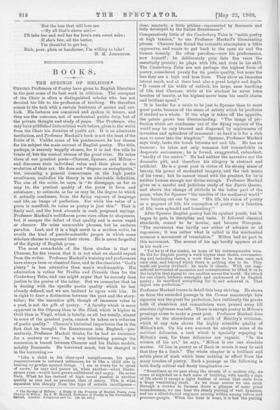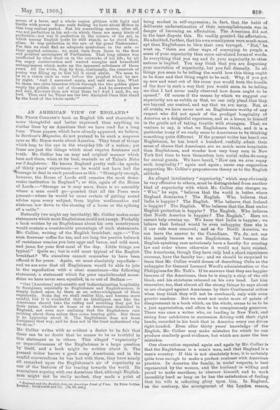BOOKS.
THE SPRINGS OF HELICON.* OXFORD Professors of Poetry have given to English literature in the past some of its best work in criticism. The occupant of the Chair is often a distinguished scholar who has not devoted his life to the profession of teaching. He therefore comes to the task with a certain freshness of accent and out- look. His lectures are conceived and spoken in leisure, and they are the outcome, not of mechanical public duty, but of the private thought and study of years. The Professor, who may have putltelted little critical work before, gives to the world from the Chair his doctrine of poetic art. It is an admirable institution, and Professor Mackail's book is not the least of the fruits of it. Unlike some of his predecessors, he has chosen for his subject the main current of English poetry. The title, perhaps, is scarcely happily chosen, for it is not the rills he treats of, but the central stream of the great river. He takes three of our greatest poets—Chaucer, Spenser, and Milton— and discusses their individual value and their place in the evolution of their art. He does not "dispute on metaphysics," but, assuming 'a general concurrence on the high poetic excellences, embodies his theory in an admirable definition.
The aim of the critic, he says, is "to disengage, as far as may be, the poetical quality of the poem in form and substance ; to estimate, as far as may be, the degree to which
it actually condenses, from the flying vapours of language and life, an image of perfection. For while the value of a poem is manifold, its value as poetry is just this." That is finely said, and the book abounds in such pregnant sayings. Professor Mackairs mellifluous prose rises often to eloquence, but it escapes the defect of that quality and is never vapid or obscure. He coins memorable phrases, but be eschews paradox. Last, and it is a high merit in a modern critic, be avoids the kind d pseudo-scientific jargon in which some Scholars choose to expound their views. He is never forgetful of the dignity of English prose.
The most remarkable of the three studies is that on Chaucer, for the reason that it is not what we should expect from the writer. Professor Mackail's training and preferences have always been on classical lines, and to the classicist "God's plenty" is less attractive than man's workmanship. His admiration is rather for Troilus and Creseide than for the Canterbury Tales, and one might argue that be scarcely does justice to the genius of the latter. But we remember that he is dealing with the specific poetics quality which he has already defined, and we are inclined to agree with him. It is right to draw a distinction between the poet and the story- teller; for the narrative gift, though of immense value to a poet, is not the gift of poetry. "A faculty which is more apparent in the Odyssey than in the Iliad, which is higher in Ovid than in Virgil, which is totally, or all but totally, absent in some of the greatest poets, cannot be taken as a criterion of poetic quality." Chaucer's historical importance lies in the fact that he brought the Renaissance into England,—pre- maturely, Professor Mackail thinks, for he had no successor for a century or two. In a very interesting passage the connexion is traced between Chaucer and his Italian models, notably Boccaccio. He borrowed much, hut he changed it in the borrowing :— "Like a child in his clear-eyed receptiveness, his quick responsiveness to outward influences, he is like a child also in bearing no grudge against things. '1 am so weary for to speak of sorwe,' he says and passes on, when another—when Shake- speare even—would have grown embittered and angry. He never frets. What he has instead of high moral passion is another quality as rare and as precious, that of mercy. This is what separates him sharply from the type of artistic intelligence-
* The Springs of Helicon, a Stusly in the Progress of English Poetry from Chaucer to Milton. By J. W. Raclin% Professor of Poetry in the University of Oxford. London: Longinans and Co. [4a. Od, ad.] clear, masterly, a little pitiless—represented by Boccaccio and fully developed by the Italian Renaissance."
Comparatively little of the Canterbury Tales is "noble poetry at high tension," to use Professor Mackail's illuminating phrase. Chaucer has found the romantic atmosphere a little oppressive, and wants to get back to the open air and the human comedy. He often parodies,—now his predecessors, now himself ; he deliberately puts into fine verse the essentially prosaic; he plays with life, and riots in his skill. The Canterbury Tales are not perhaps the highest form of poetry, considered purely for its poetic quality, but none the less they are a high and true form. They show an immense lateral reach, and at their best also a great height and depth. "It comes of his width of outlook, his large, sane handling of life, that Chaucer, while at his slackest he never lodes touches of beauty, at his highest never loses his sunlit charm and brilliant speed."
It is harder for a critic to be just to Spenser than to most great poets, because of the sense of satiety which he produces if studied as a whole, If the edge is takeu off the appetite, the palate grows less discriminating. "The image of per- fection which art condenses out of the flying vapours of the world may be only blurred and dispersed by copiousness 'of invention and splendour of ornament : so hard is it for a rich man to enter into the kingdom." Spenser, Professor Mackail says truly, lacks the touch between art and life. He has no humour; he takes not only romance bat romanticism in desperate seriousness ; he is forced, exaggerated, redundant, " hardly of the centre." He had neither the narrative nor the dramatic gift, and therefore his allegory is abstract and artificial. He is a great poet in virtue of his strong sense of beauty, his power of enchanted imagery, and the rich music of his verse; but he cannot stand with the greatest, for he is neither human enough nor divine enough. Professor Mackail gives us a careful and judicious study of the Faerie Queene, and shows the change of attitude in the latter part of the poem, when for Spenser "the candles of the mediaeval world" were burning out one by one. "His life, his vision of poetry as a pageant of life, his conception of poetry as a function of life, were splendid and transitory."
After Spenser English poetry lost its opulent youth, but it began to gain in discipline and taste. It followed classical standards, ceased to be insular, and became European. "The movement was hardly one either of advance or of regression; it was rather what is called in the mechanical sciences a movement of translation." Milton had no part in this movement. The accent of his age hardly appears at all in his work
:- "Yet he is of the centre, as none of his contemporaries were. He did for English poetry a work higher than theirs, overmaster- ing and including theirs, a work that has to be done once and once only, and beyond which there is nothing else to do, They made our poetry civilised: he made it classic. With one mag- nificent Movement of ascension and concentration he lifted it onto the heights that signal to one another across the world. He struck for one object, hitherto unsought and undreamed of by English poetry he sacrificed everything for it, and achieved it. That object was perfection."
Professor Mackail traces in detail this long striving. He shows us from the amended passage in the Comus manuscript how rigorous was the quest for perfection, how ruthlessly the graces both of classicism and romazticism were pruned away till absolute rightness was left, There is enough poetry in Milton's prunings alone to make a great poet. Professor Mackail does justice to the shrewdness of much of Bentley's criticism, which at any rate shows the highly scientific quality of
Milton's art. On his own account he analyses some of its metrical delicacies, a task which is specially repaying in
Milton's case, for these delicacies are organic. "In the science of his art," he says, "Milton is our one absolute master. Of him in poetry as of Bach in music it may be said that they fix a limit." The whole chapter is a brilliant and subtle piece of work which loses nothing in effect from the many touches of poetry. Such a passage as the following is both finely critical and finely imaginative :- "Sometimes as we pass along the streets of a modern city, we come at nightfall on a dark mass of building, with hardly a sign of life about it except a light feather of steam that curls from a huge ventilating shaft. As we corns nearer we can catch through a crevice in furnace doors a glimpse of some great incandescence, we can hoar the steady purring of vast dynamos, and see a silent-footed engineer moving within among valves and pressure-gauges. Whoa the hour is come, it is but the pulling across of a lever, and a whole region glitters with light and thrills with power. Some such feeling we have about Milton in that long central period. But his controlling motive, after all, was not perfection in his art—in which there are many kinds of perfection—nor was it perfection in the science of his art, in which among English poets he still stands, as he stood then, alone. It was perfection in the eye of his great Taskmaster. For this we shall flad no adequate symbolism in the arts or their applied sciences; we must turn from these to the first and greatest messengers of Puritanism. That long silence was unaffected by what went on in the outworks of his life ; by all the angry controversies and wasted energies and household unhappinesses which make up the apparent substance of those years. All the while, drop by drop, continually, the reservoir of poetry was filling up in him till it stood abrim. We seem to be in a vision such as rose before the prophet when he saw by night, And I answered again, and said unto him, What be these two olive branches which through the two golden pipes empty the golden oil out of themselves P And he answered me and said, Knowest thou not what these be? And I said, No, my lord. Then said he, These are the two Anointed Ones that stand
by the Lord of the whole earth." •











































 Previous page
Previous page